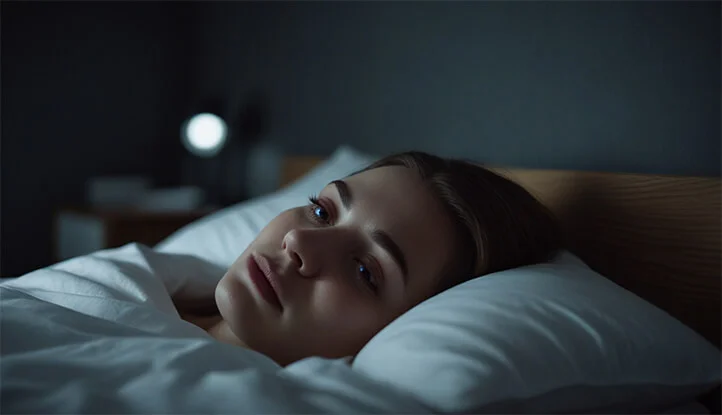Insomnia is a widespread issue that affects people of all ages and backgrounds. It is characterized by difficulties in falling asleep, staying asleep, or getting a restful night’s sleep. Good sleep is essential for physical and mental health, helping to restore energy, boost the immune system, and improve cognitive function.
According to the American Academy of Sleep Medicine, about 30% of adults in the United States suffer from chronic insomnia, while 10-15% experience temporary insomnia. People with insomnia often complain of fatigue, irritability, concentration problems, and reduced daytime performance.
Chronic insomnia can have serious health consequences, including an increased risk of heart disease, stroke, obesity, depression, as well as a decrease in quality of life. Therefore, understanding the causes of insomnia and developing effective methods to eliminate it is of paramount importance.
In this article, I will examine in detail the main factors contributing to the development of insomnia and analyze the most effective ways to restore healthy sleep. Familiarizing yourself with this information will help you understand the root of the problem and develop an individualized treatment strategy.

Physical Causes of Insomnia
Many physical problems and conditions can disrupt the natural sleep process. The most common physical causes of insomnia include:
- Pain or physical discomfort. Chronic pain caused by conditions such as arthritis, fibromyalgia, migraines, or injuries can severely disrupt sleep. Even less intense pain can distract and interfere with the ability to enter deeper phases of sleep.
- Chronic illnesses. Some common chronic conditions, including:
- Sleep apnea – breathing disruption during sleep leading to frequent awakenings;
- Asthma – breathing difficulties can prevent a full night’s rest;
- Acid reflux disease – heartburn and chest pain make falling asleep difficult;
- Diabetes – blood sugar fluctuations interfere with maintaining a regular sleep cycle;
- Thyroid disorders – hormone imbalances affect sleep.
The Impact of Medications on Sleep
Many common medications can disrupt natural sleep cycles. These include:
- Corticosteroids – often cause insomnia as a side effect;
- Some antidepressants, such as fluoxetine (Prozac), may stimulate wakefulness;
- Beta-blockers used to treat high blood pressure and angina;
- Diuretics, which cause frequent nighttime urination;
- Steroidal and non-steroidal anti-inflammatory drugs when taken long-term.
If you notice sleep problems after starting a new medication, be sure to consult your doctor.
The Impact of Stimulants on Sleep
The consumption of stimulants such as caffeine, alcohol, nicotine, and some prescription drugs, especially later in the day, can have a highly negative impact on sleep quality. Here’s how they affect sleep:
- Caffeine – stimulates the central nervous system and makes falling asleep difficult;
- Alcohol – although it may help you fall asleep faster, it disrupts normal sleep cycles;
- Nicotine – acts as a stimulant, causing trouble falling asleep;
- Some cough and cold medications contain stimulating substances.
Try to avoid stimulants for several hours before bed. This can help prevent their negative effects on a full night’s rest.
Psychological Causes of Insomnia
Mental health has a huge impact on sleep quality. Stress, anxiety, and mood disorders can severely disrupt the sleep cycle. Here are some common psychological factors associated with insomnia:
- Stress and anxiety disorders. Chronic stress causes constant stimulation of the nervous system and the production of the stress hormone cortisol, making it difficult to relax and enter deep sleep. Anxiety disorders, such as generalized anxiety disorder (GAD), often lead to insomnia due to persistent feelings of worry.
- Depression. People with depression often suffer from insomnia or excessive daytime sleepiness. A melancholic mood, lack of energy, and negative thoughts make it difficult to get adequate rest at night.
- Post-traumatic stress disorder (PTSD). After a psychological trauma, people with PTSD often experience nightmares, insomnia, and awakenings triggered by memories of the traumatic event.
- Bipolar disorder. During manic episodes, the natural sleep cycle is disrupted due to overexcitement. During depressive phases, insomnia can also intensify.
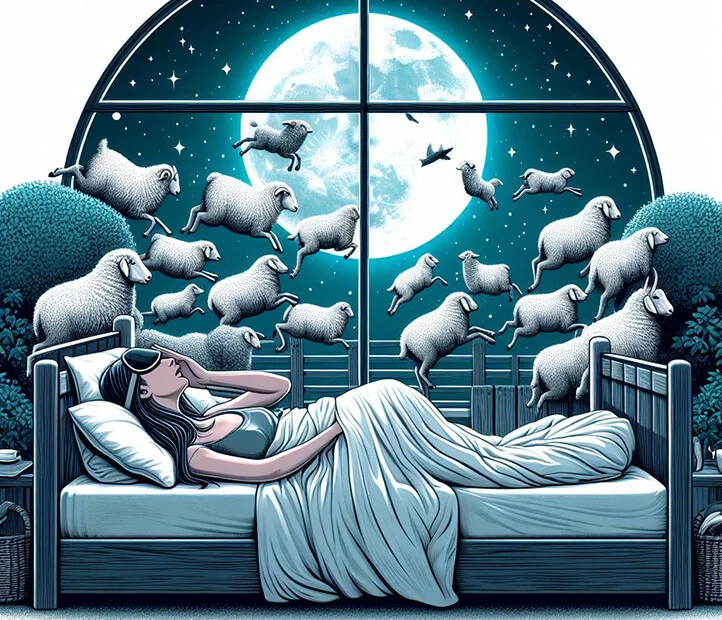
Causes of Insomnia in Women
Due to hormonal changes at different stages of life, women are more prone to insomnia than men. Here are the key periods when women are most vulnerable to sleep disturbances:
- Pregnancy. In the first trimester, many women experience nausea, heartburn, and increased frequency of urination, which interferes with proper sleep. In the third trimester, increased physical strain, back, and leg pain can also cause insomnia.
- Premenstrual syndrome (PMS). Sudden changes in estrogen and progesterone levels before menstruation often lead to PMS symptoms, such as anxiety, irritability, and sleep disturbances.
- Menopause. During menopause, estrogen levels decrease, which can cause hot flashes, night sweats, insomnia, and other sleep problems.
- Postpartum depression. Hormonal changes and stress after childbirth increase the risk of postpartum depression, often accompanied by insomnia.
Hormonal Imbalance and Sleep Disorders
Fluctuations in the levels of sex hormones like estrogen, progesterone, and testosterone play a key role in regulating sleep in women. An imbalance of these hormones can negatively affect circadian rhythms and sleep structure.
Estrogen level fluctuations during the menstrual cycle can cause PMS symptoms, including anxiety, irritability, and sleep disturbances. Low estrogen levels during menopause are also linked to insomnia due to increased hot flashes and night sweats.
Progesterone, an anti-inflammatory and sleep-inducing hormone, increases in the second half of the menstrual cycle and during pregnancy. A sharp decrease in progesterone can trigger sleep disorders.
Therefore, monitoring and correcting hormonal changes in women is an important factor in maintaining healthy sleep.
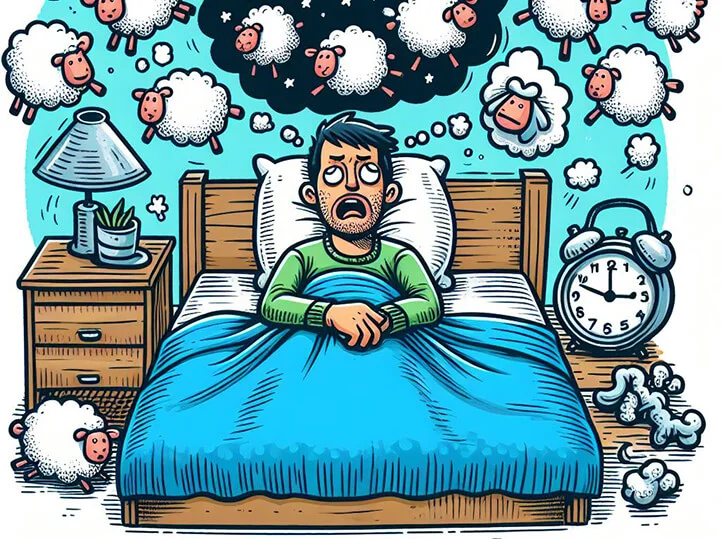
Causes of Insomnia in Men
While men are less prone to hormonal changes, certain factors can still cause insomnia. These include:
- Low testosterone levels. As men age, testosterone, the primary male sex hormone, gradually decreases. This can lead to night sweats, frequent awakenings, and poor sleep quality.
- Prostatitis and other urological disorders. Pain, discomfort, and frequent urges to urinate due to prostatitis, urinary tract infections, and other urological conditions can severely disrupt sleep.
- Work-related stress. Job stressors cause anxiety and nervousness, often leading to insomnia in many men.
- Family responsibilities and fatherhood stress. Stress from family responsibilities, caring for children, and added financial burdens can affect sleep in young fathers.
Obstructive Sleep Apnea Syndrome in Men
Obstructive sleep apnea syndrome (OSAS) is one of the leading causes of insomnia in men. This disorder involves temporary breathing stoppages during sleep due to upper airway obstruction, leading to loud snoring, frequent awakenings, and lack of oxygen.
Research shows that OSAS is more common in overweight men with neck obesity and hypertension. The risk of developing this disorder also increases due to smoking, alcohol consumption, and sedative use.
Insomnia caused by OSAS can lead to serious issues, such as daytime sleepiness, headaches, fatigue, and an increased risk of cardiovascular diseases. Therefore, it is crucial to recognize and treat sleep apnea syndrome in a timely manner.
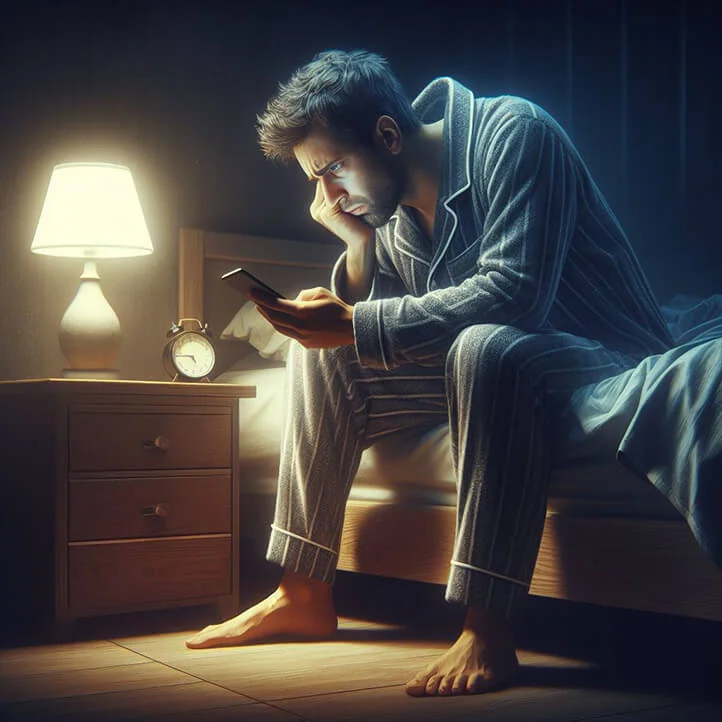
Lifestyle and Environmental Factors
Lifestyle and the environment in which we sleep also affect sleep quality:
- Irregular sleep schedule. Lack of a consistent sleep and wake schedule is one of the main causes of insomnia. Repeated disruption of circadian rhythms leads to imbalances in melatonin and other sleep hormones.
- Noisy and bright bedroom. Noise from street traffic, neighbors, or household appliances, along with bright light from lamps or electronic devices, can hinder falling asleep and contribute to shallow sleep.
- Unhealthy diet. Overeating, especially at night, and excess fatty, fried, salty foods, as well as those high in sugar, can disrupt sleep.
- Sedentary lifestyle. Lack of physical activity and a sedentary lifestyle are associated with poorer sleep quality and a higher risk of sleep apnea.
- Use of electronic devices before bed. Bright light from smartphone, tablet, and computer screens suppresses melatonin production and prevents the body from relaxing before sleep.
The Importance of a Sleep Routine
Maintaining a regular sleep routine is crucial for overcoming insomnia. Going to bed and waking up at roughly the same time every day helps synchronize the body’s internal circadian rhythms and establish a stable sleep-wake cycle.
Experts recommend aiming to fall asleep between 10:00 p.m. and midnight, as this is when the body naturally starts producing melatonin, the hormone that regulates sleep and wake cycles. A consistent bedtime will reinforce this pattern.
Additionally, it’s important to stick to a routine on weekends and avoid significant shifts in sleep patterns. Sudden changes can disrupt circadian rhythms and worsen insomnia.
Of course, finding the perfect sleep routine can be challenging due to work, social obligations, and other factors. However, even small improvements in this area can positively impact sleep quality.
Creating the Ideal Bedroom
The conditions in your bedroom play an important role in overcoming insomnia. Creating a comfortable and relaxing environment can significantly improve sleep quality. Here are some tips for optimizing your bedroom:
- Minimize noise. Use earplugs, white noise machines, or sound-blocking devices if noise is preventing you from falling asleep. Soundproofing walls and windows can also help create a quieter environment.
- Maintain a cool temperature. The ideal sleep temperature is around 18-21°C. A bedroom that’s too warm can disrupt deep sleep phases.
- Ensure darkness. Use heavy curtains or blinds to block out light from outside. Light suppresses melatonin production and makes it harder to enter deep sleep phases.
- Choose a comfortable bed and bedding. An orthopedic mattress and comfortable pillows will prevent back and neck pain that can disrupt sleep. Opt for natural, breathable fabrics.
- Clean the air. Use humidifiers or air purifiers to maintain optimal humidity levels and remove allergens from the bedroom.
- Avoid electronic devices. Don’t use TVs, computers, tablets, and smartphones for 1-2 hours before bed, as their light suppresses melatonin.
By creating the ideal environment for nighttime rest, you can more easily enter deep and restorative sleep.
The Impact of Diet on Sleep
What we eat can also have a significant impact on sleep quality. When planning your diet, it’s important to consider several factors:
- Avoid heavy meals and caffeinated drinks late at night, as they can cause restlessness and make it difficult to fall asleep.
- Try not to overeat before bed, as a full stomach can trigger heartburn and restless sleep.
- Include foods rich in tryptophan, such as dairy products, nuts, seeds, legumes, and turkey.
- Drink calming herbal teas (chamomile, lemon balm, valerian) 1-2 hours before bed. They help you relax.
- Avoid consuming alcohol before bed. Although it may initially induce drowsiness, alcohol disrupts normal sleep cycles during the second half of the night.
A proper diet, combined with other healthy lifestyle habits, can help synchronize circadian rhythms and improve sleep quality.

Age-Related Factors Affecting Sleep
At different stages of life, the need for sleep changes. It is important to understand how age affects the structure and quality of sleep to recognize and address problems in a timely manner.
Children and adolescents have a greater need for sleep to support active growth and development. The recommended amount of sleep is:
- Infants (4-12 months): 12-16 hours per day
- Children aged 1-2 years: 11-14 hours
- Children aged 3-5 years: 10-13 hours
- Children aged 6-12 years: 9-12 hours
- Adolescents aged 13-18 years: 8-10 hours
Lack of sleep at this age can lead to problems with behavior, attention, and academic performance.
- For adults (18-64 years), the need for sleep is 7-9 hours. However, after the age of 30, many people begin to experience sleep disturbances.
- For older adults (65+), problems with falling asleep and maintaining sleep often arise due to changes in circadian rhythms and the natural aging process. Additionally, chronic illnesses, which are more common in older age, also contribute to insomnia.
Understanding the age-specific characteristics of sleep helps identify and address sleep-related issues at different stages of life.

How to Treat Insomnia
Identifying and addressing the causes of insomnia is crucial for choosing an effective treatment strategy. Since insomnia can be triggered by a variety of physical, psychological, and behavioral factors, an individual approach is required. However, there are some general principles and methods commonly used to restore healthy sleep.
The most effective approach is a comprehensive one that combines different therapies. Depending on the severity and duration of insomnia, non-drug methods, lifestyle changes, and sleep hygiene improvements may be applied, and in some cases, temporary medication under strict medical supervision may be necessary.
For mild forms of insomnia, the least invasive methods are usually the first to be tried, gradually moving to more active measures if symptoms persist. Patience, consistency, and a willingness to make necessary changes to daily routines are key to success.
Non-Drug Methods
For short-term insomnia or mild insomnia, it is recommended to start with non-drug methods:
- Sleep hygiene. Follow a regular sleep schedule, create an ideal sleep environment, avoid using electronic devices and physical exertion before bed. These habits help synchronize circadian rhythms.
- Relaxation techniques. Practice relaxation and stress management methods such as bedtime meditation, yoga, breathing exercises, progressive muscle relaxation, and visualization. These help relax the mind and body before sleep.
- Cognitive behavioral therapy (CBT). Helps overcome negative beliefs and thought patterns related to sleep. It teaches relaxation techniques, eliminates harmful habits, and changes counterproductive behavior.
- Light therapy. Exposure to bright light during the day synchronizes circadian rhythms and increases melatonin production at night.
- Rational approach to napping. Avoid overly long or late naps to avoid disrupting the night cycle.
If non-drug methods do not produce results within a few weeks, you should consult a doctor for more serious treatment.
Medication Therapy
For chronic or treatment-resistant insomnia, doctors often prescribe medications:
- Sleeping pills. Modern sleeping pills (e.g., zolpidem, eszopiclone) help fall asleep faster and stay in deeper sleep phases longer. However, they should only be used on a doctor’s recommendation due to the risk of side effects and dependency.
- Sedative drugs (benzodiazepines). Medications such as temazepam, triazolam, etc., have a strong hypnotic effect. However, long-term use is dangerous due to the high risk of addiction, tolerance, and negative health effects. They are recommended only for short-term use.
- Some antidepressants (trazodone, mirtazapine). These medications, originally developed for depression, are often prescribed for insomnia due to their sedative properties.
- Melatonin supplements. Synthetic melatonin, in the right dose, helps regulate circadian rhythms and resolve sleep disturbances.
Medications should always be used only under a doctor’s supervision and in combination with other methods such as sleep hygiene, cognitive behavioral therapy, and lifestyle changes. Self-medicating with sleeping pills is extremely dangerous.
Alternative Methods
In addition to the main non-drug and medication approaches, there are also alternative methods for combating insomnia:
- Herbal remedies. Some herbal preparations and teas, such as valerian, lavender, and glycine, have mild sedative and calming effects. However, their safety and efficacy are not well studied.
- Acupuncture. According to some studies, acupuncture helps improve sleep quality by stimulating certain biological processes. However, evidence of its effectiveness remains controversial.
- Aromatherapy. Aromatic oils, such as lavender, ylang-ylang, and bergamot, are considered calming and promote relaxation before sleep. They are often used in massage practice.
- Other methods. Additional methods include bioacoustic correction, light therapy, electroconvulsive therapy, etc. However, they have limited evidence of effectiveness.
Alternative methods should not be seen as a replacement for the main treatment of insomnia. They are best used as complementary methods, supplementing lifestyle changes, cognitive behavioral therapy, and doctor-prescribed medications.
When to See a Doctor?
If you regularly experience difficulty sleeping for several weeks, it is important to consult a doctor. Ignoring chronic insomnia can lead to serious health problems and a decrease in quality of life.
Seek medical attention immediately if:
- Insomnia significantly affects your daily life, work, and activities.
- You experience excessive daytime sleepiness, fatigue, and difficulty concentrating.
- Unusual symptoms appear, such as temporary memory loss, confusion, or hallucinations.
- Self-treatment, lifestyle changes, or home remedies do not bring relief within a month.
The doctor will conduct a full examination to identify the causes of insomnia and develop a comprehensive treatment plan tailored to your age, overall health, and individual characteristics.
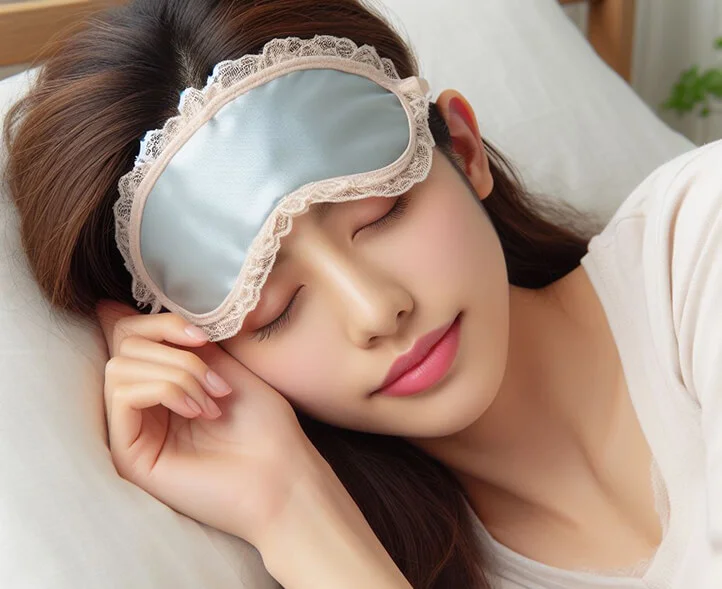
Conclusion
Insomnia can have many diverse causes—from physical illnesses and psychological disorders to lifestyle and environmental factors. Identifying the main causes contributing to a specific case of insomnia is key to choosing optimal treatment methods.
Remember, chronic insomnia seriously affects physical and mental health, increasing the risk of many diseases, such as cardiovascular disease, diabetes, and depression. Sleep disturbances also negatively affect performance, cognitive functions, and overall quality of life.
If you have been suffering from insomnia for several weeks or months, do not ignore the problem. It is important to seek professional help from a doctor or sleep disorder specialist. Only after a complete diagnosis and identification of the main causes of insomnia can an effective treatment plan be developed.
In most cases, overcoming insomnia requires a comprehensive approach, combining lifestyle changes and sleep hygiene, non-drug methods such as cognitive behavioral therapy, relaxation, and stress management, and if necessary, temporary medication prescribed by a doctor. It is important to be patient and consistent, sticking to the strategy developed.
Restoring full, restful sleep is a process that takes time and effort. However, the results are worth it. Quality rest is the key to high energy levels, productivity, and overall well-being during the day. By working on overcoming insomnia, you will feel refreshed, more focused, and ready for new achievements.
